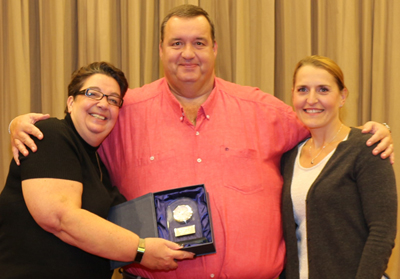Care boss praises non-abusive training which has transformed his organisation
Opened in 1994, Avens has grown from a single residential care home, in East Sussex, to three homes and more than 20 supported living locations, across East Sussex and the East Midlands. They provide care and support to 150 customers with a range of disabilities and employ 250 staff.
Chris Andrews, Chief Executive of Avens Ltd. recognises the importance of good staff training.
"Prior to becoming involved with NAPPI UK we had numerous incidents with challenging behaviour. This was leading to staff injuries and was affecting both staff and customer morale, as well as costing the company money. There was not a consistent approach to challenging behaviour and techniques were re-active, rather than pro-active. The company realised it had to do something and looked for outside expertise and found NAPPI UK."

"After training our staff using NAPPI UK, challenging behaviour incidents decreased dramatically. Staff were now able to recognise and defuse situations before they escalated. Staff injuries became a rare occurrence and morale improved, our staff felt more confident in their ability to successfully deal with challenging behaviour. As a result, customers were happier and more settled."
Specialist training company NAPPI UK has been in partnership with Avens since 1999 - and Mr Andrews said NAPPI's non-abusive ethos has been key to Avens growth and success.
NAPPI promotes getting to know customers, developing strong relationships and improving quality of life. Understanding how behaviour is used to communicate unmet needs is central to avoiding behaviours of concern.
Mr Andrews said: "The impact NAPPI had on our home was apparent overnight. By giving staff a toolkit to recognise differing levels of behaviour, staff understood how to respond and change their approach to individuals, consequently generating cooperation. This person specific technique meant we saw a 90% reduction in incidents over the following years."
"One customer came to us from a Mental Health wing in a hospital. There they needed two to one supervision due to their needs and challenging behaviour, which saw them assaulting staff."
"We discovered that they loved singing songs from musicals - so we bought them a CD. When we spotted the triggers for their challenging behaviour, we would implement our NAPPI training and instead of saying 'don't do that' we suggest having a cup of tea and going to their room to listen to their music and sing."
"This has been extremely effective and has greatly reduced both the number and duration of incidents with this individual."
NAPPI training has provided Avens with an umbrella for general staff training, but they have also delivered specific sessions including one that developed methods to support an individual with extremely complex needs who was resistive to personal care. Where incidents previously occurred several times a week, this has since happened only once in eighteen months.
"We don't use restraint at Avens. We use positive reinforcement, which has made our homes safer and happier places to live and work in."
The company has staff trained in delivering NAPPI training and has been awarded a NAPPI Centre of Excellence certificate which Mr Andrews said was "a proud moment." NAPPI UK Managing Director Helen Tait added: "It has been a privilege to work in partnership with Chris and his team at Avens for almost two decades! 20 years of making an enormous difference, of uncountable success stories, and a relationship that goes from strength to strength." Avens has provided care to young adults - aged 18-65 - with learning disabilities since 1994. Its customers can have one or more issues including Downs Syndrome, Autistic Spectrum Disorder, Bi-Polar, Physical Disabilities, Communication Difficulties, Epilepsy, Personality Disorders, Acquired Brain Injury. But care is focused on the individual rather than the categories they fall into.
Find out more about Avens here.
Find out more about NAPPI courses here or call us on 01723 353353.
